nothing here but a dangerous and irrational toilet - issue 227 - 23rd July, 2023
nothing here but a dangerous and irrational toilet
issue 227 - 23rd July, 2023
CJW: Welcome back. Hope you're keeping your head above water, and taking the time to look out for yourself and those closest to you. Let's get to this fortnight's dispatch, shall we.
If you want to support us, you’ve got a couple of options:
Both give you access to the full bonus archive, as well as new bonuses as they are posted. Another thing you can do to help spread the word is forward this email to someone you think might enjoy it.
Dan wrote our latest bonus: How an extremist hate group used lies to help SCOTUS deliver an unconstitutional attack on LGBTQ rights
The Team
Daniel Harvey (DCH) - Designer, writer, provocateur. Pro-guillotine tech critic. @dancharvey
Marlee Jane Ward (MJW) - is also Mia Walsch. Writer, apocalypse witch, goth aunt.
Corey J. White (CJW) - Author, sin-eater, future sweetie-pie.
Lidia Zuin (LZ) - Journalist, MA in semiotics, and PhD in Arts. Sci-fi writer, futurology researcher and essayist. @lidiazuin
Climate Change & The Environment
CJW: ‘Climate Optimism’ Is Dangerous and Irrational - Jag Bhalla at Current Affairs
It’s light-years beyond foolish to bet on cascading feedback and butterfly effects all landing favorably. We must act to aggressively minimize risks—especially of doom-delivering impacts on the planet’s poor. When economists (or other math-addled nerds) attempt intricate “optimal” policy tradeoffs, they’re admitting that they’re lost in model la-la-land.
Significant details of the degree of “fit” to recent earth-system measurements of our best models isn’t looking so rosy, indeed they’re thoroughly thorny—impacts on sea levels, the water cycle, humidity, and local temperature deviations are all arriving ahead of when models had predicted.
[...]
We must be super clear about what current “optimistic” media preferences mean in terms of this specific risk: How likely are we to collectively mount a coherent and commensurate response to the multiple encircling crises when their foreseeable harms are de-emphasized in policy-shaping report summaries and filtered entirely out of upbeat media? One concrete illustration of our scientific uncertainties can be seen in a recent Washington Post article headlined “Scientists are baffled why oceans are warming so fast.”
This is a great (and long, and detailed) write-up on recent climate optimism and its basis in shoddy modelling. One interesting fact raised is that when the IPCC first mentioned carbon capture and storage in one of their reports it was a cautious suggestion concerning something that might one day be useful. Just a few years later though, it became “central to nearly all scenarios of the IPCC Fifth Assessment Report that are compatible with a 2°C target,” despite very little having been done in the way of research and development.
//
CJW: We Need To Name and Shame Bad Climate Journalism - Nathan Robinson at Current Affairs
It is the job of journalists to connect the dots for people, to show them the link between the profiteering of oil and gas companies and the deaths of people from heat stroke. Deepening that understanding is crucial to getting people to feel they can alter their situation through taking collective political action.
[...]
What would responsible journalism on extreme weather look like? First, it would follow the Berkeley criteria. Every article needs to mention the basic facts: global warming is happening, it’s caused by burning fossil fuels, it’s permanent, it’s worse than ever, and there’s a scientific consensus on it. Any article that covers a global warming related catastrophe without mentioning these facts should be considered denialist propaganda. If you see an article on extreme heat or wildfires that does not mention the basic facts, contact the journalists and their editors and ask them, politely but firmly, why they excluded these facts. Hold the media accountable. Shame them when they do the bidding of the fossil fuel industry.
Related to the above. I read Current Affairs but skip over everything by Robinson because of his firing of organising CA staff, but I gave this one a read after Dan Hill mentioned it in his newsletter, A Pleasurable Headache.
Issues with Robinson aside, I can't argue with the points made here.
//
To Save the Planet, Should We Really Be Moving Slower? - Bill McKibben at New Yorker
The Case For Reforesting Our Cities - Clive Thompson (via Sentiers)
The Last Generation’s Climate Rebellion - Jeffery Arlo Brown at Noema - CJW: I enjoyed this long read on Germany's Last Generation climate protestors.
Geopolitics & Empire
Narendra Modi Is Using Brutal Repression to Silence the People of Kashmir - Somdeep Sen at Jacobin - A good summary of Modi's military suppression of Kashmir.
Just the headlines:
Russian Militia Has Links to American Neo-Nazi and Anti-Trans Figures Ben Makuch • The Intercept
Column: Social media promised us democracy — but gave us dictatorships by Brian Merchant • Los Angeles Times
Science & Space
Satellites Are Rife With Basic Security Flaws - Matt Burgess at Wired - CJW: Don’t just hack the planet, hack orbit too.
Tech & Design
CJW: Might as well go for a soda - by Rob Horning
One theory about Musk’s acquisition of Twitter, which Broderick partly sketches out, is that it allowed a billionaire to singlehandedly neutralize a site where oppositional discourse could still gain traction, where insurgent movements could gather momentum and the oppressed could speak truth to power and extract accountability from otherwise indifferent institutions. At the same time, Musk could amplify the demagoguery and divisiveness that has traditionally splintered the oppressed classes and make the site function like conservative talk radio or local TV news broadcasts.
Facebook and TikTok approach the same goal from the opposite direction. They don’t aspire to produce and administer divisiveness as spectacle; they instead produce a false unity of populations equally and algorithmically stupefied on an individualized basis by entertainment programming. Both these approaches aim to render “the masses” as politically inert and easily controlled; both make the participatory aspects of social media into de facto forms of self-depoliticization, akin to what Marcuse described as “repressive desublimation.” (As he cheerfully puts it, “Pleasure generates submission.”)
Rob Horning back from holidays with some unsurprisingly great insights. The first half covers tourism and generative AI, the second is on social media and Twitter clones, and is where the above quote comes from.
//
DCH: Lessons From the Catastrophic Failure of the Metaverse by Kate Wagner • The Nation
The sheer scale of the hype inflation came to light in May. In the same article, Insider revealed that Decentraland, arguably the largest and most relevant Metaverse platform, had only 38 active daily users. The Guardian reported that one of the features designed to reward users in Meta’s flagship product Horizon Worlds produced no more than $470 in revenue globally. Thirty-eight active users. Four hundred and seventy dollars. You’re not reading those numbers wrong. To say that the Metaverse is dead is an understatement. It was never alive.
They hype inflation came from firms like McKinsey and financial services companies like Citi who claimed the metaverse would be worth 5 trillion and 13 trillion dollars respectively. Banks hyping consultants pimping tech bros. Its con artists all the way down.
//
DCH: An A.I. Utopia Is No Place For Humans by Christopher Pearce • bloodknife.com
This is the future laid out before us: the end of all artistic and intellectual professions, and the mass proletarianization of everyone. A.I. advocates might balk at this phrasing, but it’s the logical conclusion of their arguments: if A.I. really does outperform humans, what need do we have for human labor? A.I does not need to be better than humans to displace them, after all: it simply needs to be functional and cheap. Automated checkouts are slower and more susceptible to theft than human cashiers, but they are considerably cheaper than human labor in the long term and (presumably) less prone to unionization. Absent massive and systemic change in the socioeconomic order, the end result of algorithmic automation will be a mass shift of wealth and power into the hands of those who own these new engines of creation—the bourgeoisie—and, more troublingly, the end or severe curtailment of the ability of art to effect change in the world.
And if an educated worker is no longer a prerequisite for the functioning of capitalist society? Education of the masses could be greatly reduced or entirely eliminated. Education, as it currently exists, is a form of Marx’s bourgeoisie necromancy: necessary to sustain the ideological superstructure of capitalism, but at the cost of the risk of making workers more aware of their oppression and how to overthrow it. And if education is eliminated, the seeds of discontent it can sow will also be eliminated. Social efficiency, with its emphasis on schools as job training centers above all else, is already the order of the day in the American educational system. As more jobs are automated, more students will be shifted to only receiving the most basic of education—if even that. Another, more human system might see different value in the education of humans; in ours, it is necessarily the labor market that drives its perceived value, and as it moves away from humans, so too will education.
What happens when AI empowered capitalists no longer need human labor or even mass human consumption to line their pockets? Pearce offers a troubling, if somewhat far-fetched (or at least distant), potential answer. Come for the well reasoned marxist rationale, stay for the eugenics swathed in climate saviourism. And as far-fetched as that might be, it's still somehow infinitely more realistic than the existential rogue AGI skynet fantasies OpenAI,. Musk, etc want you to fret about.
//
“But focusing on the possibility of a rogue superintelligence killing off the human species may itself be harmful. It could distract regulators, the public and other AI researchers from work that mitigates more pressing risks, such as mass surveillance, disinformation and manipulation, military misuse of AI and the inadequacy of our current economic paradigm in a world where AI plays an increasingly prominent role. Refocusing on these present concerns can align the goals of multiple stakeholders and serve to contravene longer-term existential risks.” The Illusion Of AI’s Existential Risk by Blake Richards • noema
Propaganda generated by GPT-3 was 3% more effective at disguising itself from test subjects. Researchers think it might be because the text is both more structured and condensed so it’s easier to skim and process. “The fact that AI-generated disinformation is not only cheaper and faster, but also more effective, gives me nightmares,” he says. He believes that if the team repeated the study with the latest large language model from OpenAI, GPT-4, the difference would be even bigger, given how much more powerful GPT-4 is.” Humans may be more likely to believe disinformation generated by AI by Rhiannon Williams • MIT Technology Review
“Is OpenAI optimizing for performance and trying to lower cost? Are its attempts to “align” the product — or, in another interpretation, to censor its output — interfering with its performance? Was ChatGPT, the fastest-growing online service in history, just speedrunning the process of corporate “enshittification?”” Is ChatGPT Getting Dumber? by John Herrman • New York Magazine (DCH: yes. It is. But likely because of the model getting dumber as it becomes trained increasingly on its own outputs)
Just the headlines:
Latin Americans’ social feeds are being flooded with AI-generated ads by Alex González Ormerod • restofworld.org
Opinion: Elon Musk accidentally ruined Twitter. He did us all a huge favor by Aki Peritz • Los Angeles Times
FTC probes ChatGPT over possible consumer harms Helen Li • Los Angeles Times
Let the Platforms Burn by Cory Doctorow
Australia may ban WeChat – but for many Chinese Australians, it's their lifeline - ABC News
Society & The Culture
"Today’s online culture is far more inventive and daring than the arts, both formally and in terms of the ideas it presents. Ordinary people, it turns out, are far weirder than artists and writers, and more imaginative too." - Dean Kissick at The Drift
All the nerds are dead: How Andy Warhol invented nerd culture; why it's imploding - Sam Kriss (via Paul Graham Raven) + We Are All Evangelicals Now: A Nuclear Take - Adam Kotsko
Suspect Arrested in Serial Killings of Women Near Gilgo Beach by Corey Kilgannon, Joseph Goldstein, William K. Rashbaum, and Maria Cramer • The New York Times
Tucker Carlson's Twitter interview with Andrew Tate: Elon Musk is really getting desperate by Amanda Marcotte at Salon.
Health, Cooking, and Related
MJW: Girl dinners: the real reason we’ve forgotten how to feed ourselves by Günseli Yalcinkaya at Dazed
The girl dinner is one of many snack-related trends taking over social media – and our eating habits. Another trend is getting a little treat in – maybe it’s a jar of olives or a platter of cheese and bread to graze on. It’s short-term gratification – a £3 coffee en route to work posted directly onto the feed. With no economic stability or stable job prospects on the horizon, and media headlines on the climate crisis predicting the End Times, the rosy promise of an adult life where a house and mortgage are possible if you work hard enough (or have rich parents), the gamification of our eating habits seems like a decent way of getting through each day – or, at least, keep us satiated until our next little treat.
Perhaps structuring our days around little treats is akin to protecting our inner child against the pulverising daily grind. Or maybe the conditions of late capitalism have simply regressed us to the point of becoming adult babies who eat soylent slop, because we simply can’t afford to do anything else.
While capitalism IS destroying every single aspect of our lives, including cooking, this article kinda posits that being able to feed yourself is an intrinsic trait. Not if ur ND.
//
House Republicans Accidentally Released a Trove of Damning Covid Documents - Ryan Grim at The Intercept - CJW: Long story short, scientists who looked into the origin of Covid-19 in early 2020 were already seeing evidence pointing to a lab leak, but made up some shit about "wet markets" for reasons. More questions than answers, but definitely worth a look. Pangolins deserved better than this baseless libel.
Just the headlines:
Birth Control Isn’t the Only Thing That Just Went Over-the-Counter by Rachel Gutman-Wei • The Atlantic
Labour & Economics
CJW: Hollywood Studios' WGA Strike Endgame Is To Let Writers Go Broke Before Resuming Talks In Fall - Dominic Patten at Deadline
Receiving positive feedback from Wall Street since the WGA went on strike May 2, Warner Bros Discovery, Apple, Netflix, Amazon, Disney, Paramount and others have become determined to “break the WGA,” as one studio exec blatantly put it.
To do so, the studios and the AMPTP believe that by October most writers will be running out of money after five months on the picket lines and no work.
“The endgame is to allow things to drag on until union members start losing their apartments and losing their houses,” a studio executive told Deadline. Acknowledging the cold-as-ice approach, several other sources reiterated the statement. One insider called it “a cruel but necessary evil.”
God, fuck these greedy suits. They know absolutely nothing about what makes their industry tick, and not only are they refusing basic changes that these writers deserve, they are willing to grind them into dust just for a little more profit.
So glad to see actors going on strike as well.
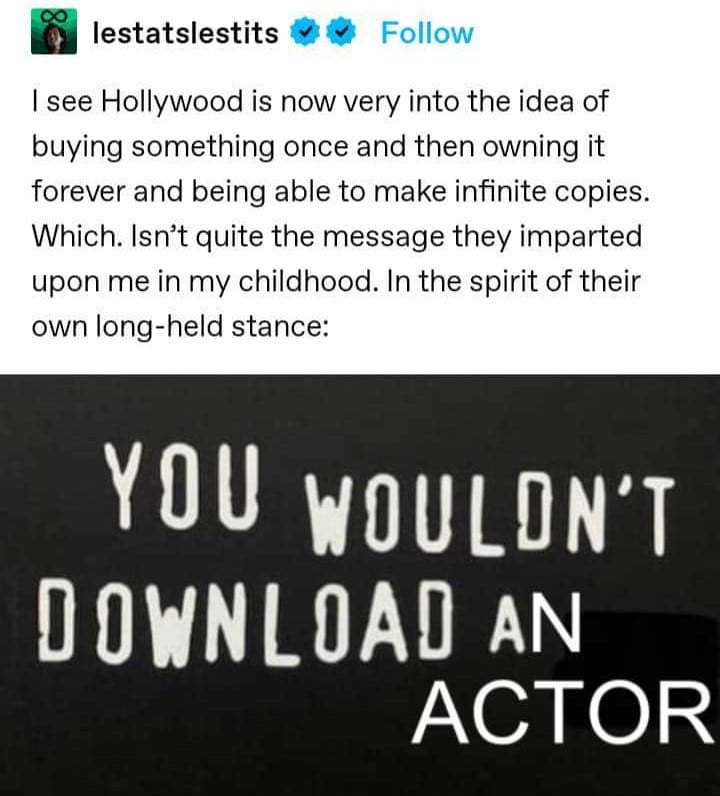
//
DCH: "The digital age is cannibalizing us" by Paris Marx • disconnect.blog
In a fiery speech yesterday announcing that SAG-AFTRA, the actors’ union, would be going on strike, national president Fran Drescher put the blame squarely on the studios. “We are being victimized by a very greedy entity. I am shocked by the way the people we have been in business with are treating us,” she said. “How they plead poverty, that they’re losing money left and right while giving millions to CEOs. It’s disgusting, shame on them.”
But Drescher also specifically pointed to how technology was being used against actors and other workers in the industry. “The entire business model has been changed by streaming, digital, AI,” she told reporters. In a later interview with The Hollywood Reporter, she expanded on those points. “Human beings in all different walks of life are being replaced by robots. And what happens here, the eyes of the world and certainly labor in this country is looking at. It’s really important that we put barricades around artificial intelligence, because it’s going to put people out of work.”
“The digital age is cannibalizing us,” Drescher declared.
Give ‘em hell, Fran. Solidarity.
//
DCH: They Don't Want Us And We Don't Need Them by David Roth • defector.com
“As Drew pointed out in his column at SF Gate, it's a remarkable testament to his unique personal virulence that anyone even knows Zaslav's name; what he represents, in his mission to homogenize all film and television into something equally cost-certain and shelf-stable and disposable, feels unusually offensive because of the extent to which it is an active attempt to drain the culture's strategic dream reserve. But he is not alone, in his cynicism or in his work, which has lately been taken up everywhere it can be taken up by the sort of people who get referred to as founders. Virtually everywhere it can be done, those executives have decided to turn their products more or less against the users that make them not just valuable, but viable.”
Hollywood has finally learned from big tech. And the lesson they’ve taken from years of disruption is that enshittification is good for their bottom line.
//
DCH: The World China Is Building by Jacob Dreyer • noema
The majority of human beings alive today live in a world of not enough: not enough food; not enough security; not enough housing, education, health care; not enough rights for women; not enough potable water. They are desperate to get out of there, as China has. They might or might not like Chinese government policies or the transactional attitudes of Chinese entrepreneurs, but such concerns are usually of little importance to countries struggling to bootstrap their way out of poverty.
The capitalist system pursues frontier technologies and profits, but companies like Huawei pursue scalability to the forgotten people of the world. For better or worse, it’s San Francisco or Shenzhen. For many countries in the Global South, the model of development exemplified by Shenzhen seems more plausible and attainable. Nobody thinks they can replicate Silicon Valley, but many seem to think they can replicate Chinese infrastructure-driven middle-class consumerism.
Apple vs Android but with geopolitical econ. 0080-=-pppp
China is exporting the building blocks of a better future to countries in the global south. And they’re doing it with a recent memory and understanding of what not having enough is like.
//
The Child Labor of Early Capitalism Is Making a Big Comeback in the US
“In December, 2020, in the depths of pandemic winter, the actress Kimiko Glenn got a foreign-royalty statement in the mail from the screen actors’ union, SAG-AFTRA. Glenn is best known for playing the motormouthed, idealistic inmate Brook Soso on the women’s-prison series “Orange Is the New Black,” which ran from 2013 to 2019, on Netflix. The orchid-pink paper listed episodes of the show that she’d appeared on (“A Whole Other Hole,” “Trust No Bitch”) alongside tiny amounts of income (four cents, two cents) culled from overseas levies—a thin slice of pie from the show that had thrust her to prominence. “I was, like, Oh, my God, it’s just so sad,” Glenn recalled. With many television and movie sets shuttered, she was supporting herself with voice-over jobs, and she’d been messing around with TikTok. She posted a video in which she scans the statement—“I’m about to be so riiich!”—then reaches the grand total of twenty-seven dollars and thirty cents and shrieks, “WHAT?”” “Orange Is the New Black” Signalled the Rot Inside the Streaming Economy by Michael Schulman (DCH: Emphasis mine)
Just the headlines:
Delivery riders are fighting each other over bike-shares in Brazil by Laís Martins • restofworld.org
Uber Eats drivers in South Africa are unionizing by Kimberly Mutandiro • restofworld.org
The workers at the frontlines of the AI revolution by Andrew Deck • restofworld.org
Newsletters
LZ: Artificial Insights by Michell Zappa
This is a newsletter written by a friend of mine who has a long experience with future studies, technology insights, and strategy. He’s the founder of Envisioning and has been playing around with LLMs and AI to understand where we might be going. Alternatively he shares interviews with different people in the market, and one of the latest issues features a few words by yours truly.
Video
CJW: Skibidi Toilet: the terrifying new creatures haunting the internet - James Greig at Dazed
Skibidi dob dob dob yes yes, skibidi dob dob eee eee
There's something compelling about these videos - the constant escalation of the war and all its bizarre facets, or possibly just the rapid rate at which they hit your eyeballs.
Music
LZ: Planetshine - In the arms of darkness
Crazy space black metal that blends with electronic music. Yes, there is a subgenre of black metal that is concerned with astronomy and tries to emulate “spacey” sounds with distorted guitars and some beeps and boops. Some bands make you think of those videos on YouTube that show you how a planet, star or black hole sounds like based on their vibrations frequency – but make it darker and add some guttural vocals, if you wish.
Art
LZ: Karin Hosono’s unbelievably cute cats

I’m not sure if Karin is painting with oil on canvas, but this is just absolutely adorable. I love how she uses some pastel or at least washed out tones. It gives such a sense of peace and reminds me of one of my favorite animations, Diary of Tortov Roddle – a surrealist short film by Kunio Kato. Lots of references to Magritte and Salvador Dali.
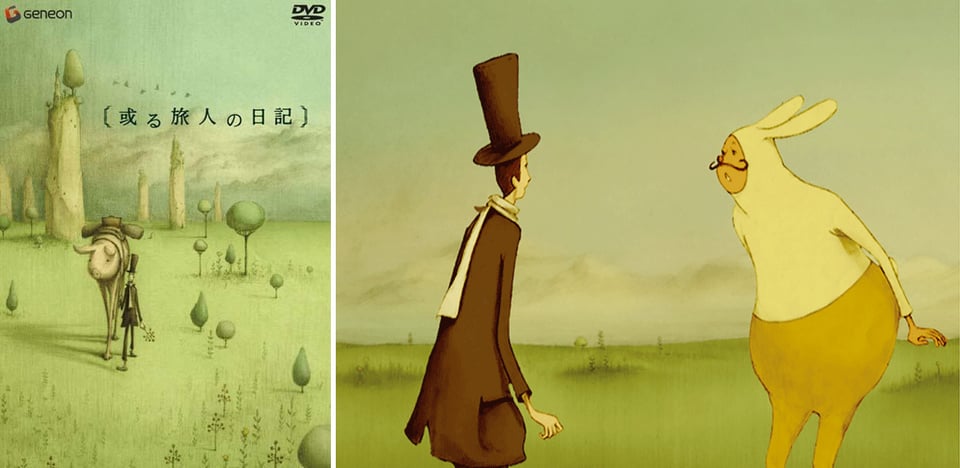
The Self-Promotion
MJW: I’ve got a new short story up at Interzone Digital. ‘Building’ is a short fiction piece about grief, community, recycling, and rolling joints. I started this piece years ago but was never able to come up with a satisfying conclusion. After stumbling across it last year after looking for some other word document (I shudder to think how many .docx are in my dropbox), I read through it and the right ending popped into my head. Sometimes these things take time. I hope you enjoy it as much as I enjoy the art that Sumit Roy made for it!
CJW: Interzone is doing some great stuff with IZ Digital, and you can sign up at their Ko-Fi for updates as they drop.
//
MJW: Oh, also! Speaking of art, I’ve been doing some illustrations as ‘Mia’ for the Tryst Blog. You can see some of my scribbles here and here (as well as enjoying great articles from Vixen Temple and Georgie Wolf.)
The Memes


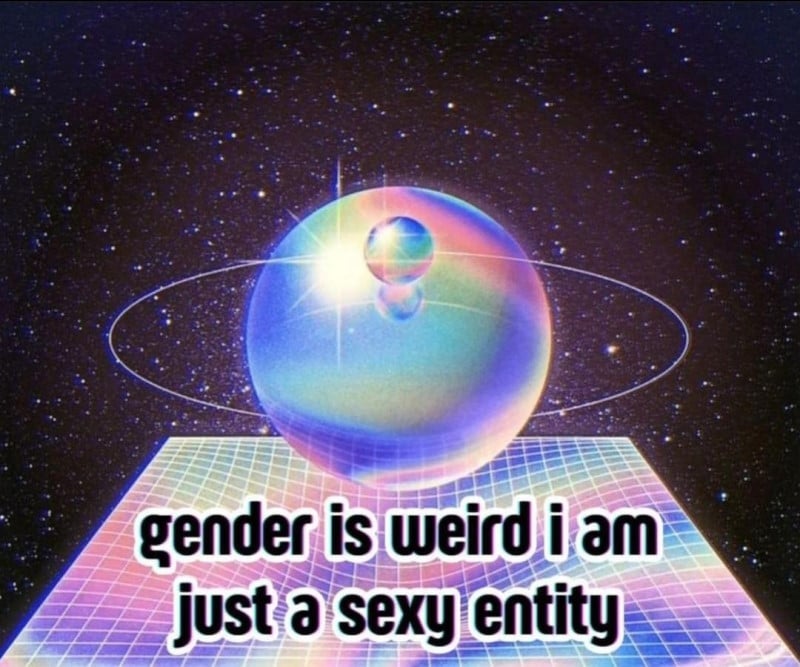
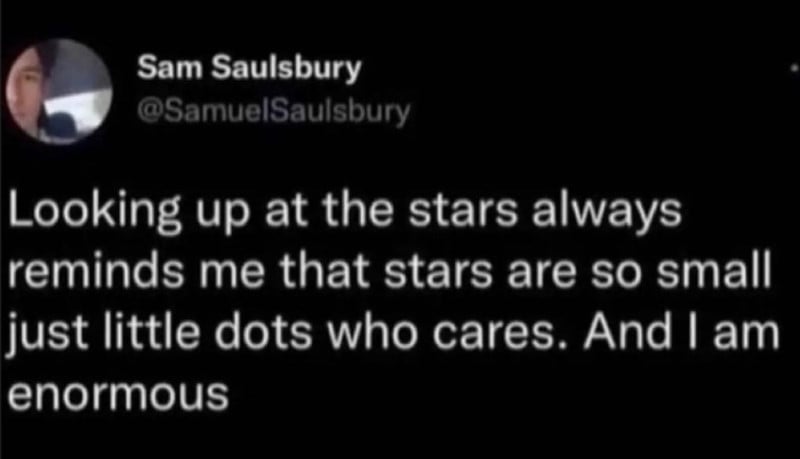
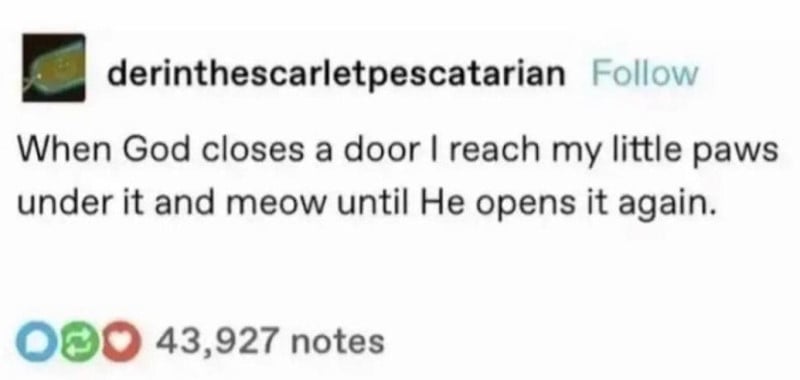
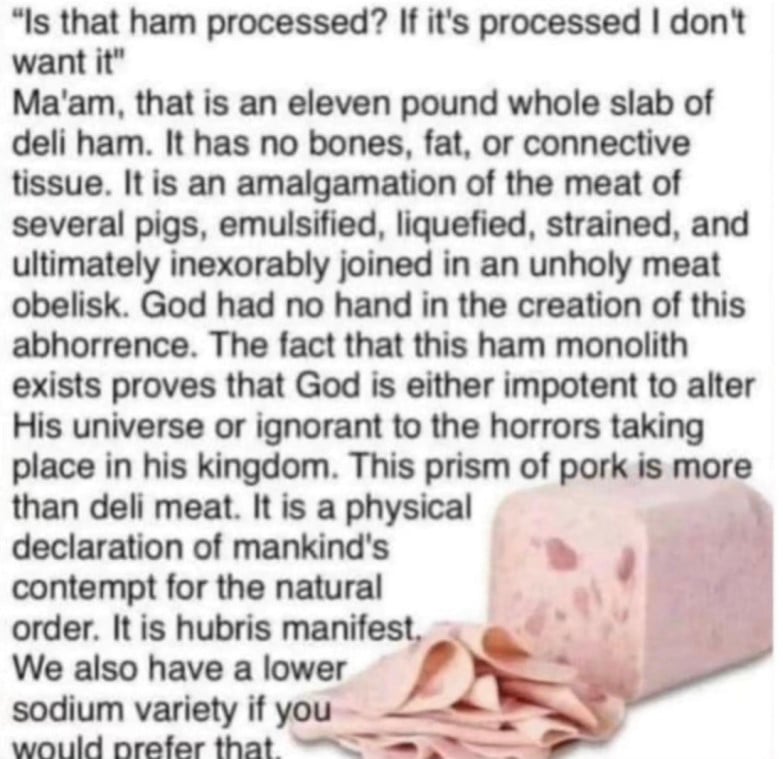
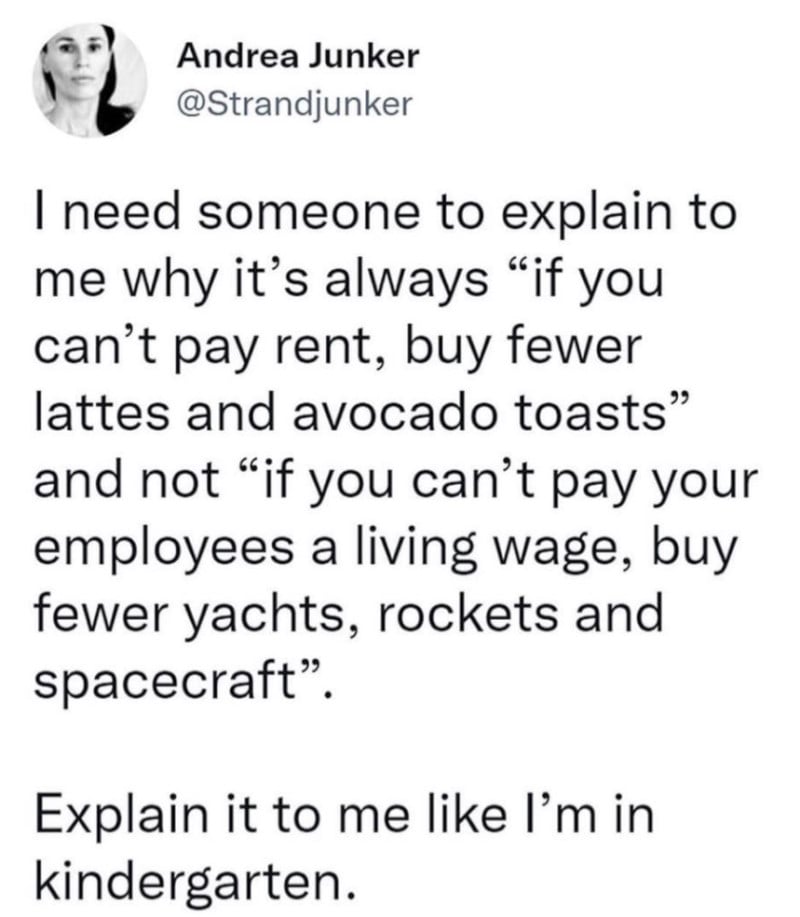
You just read issue #227 of Nothing Here. You can also browse the full archives of this newsletter.